新概念英语第 二 册知识点梳理
- 格式:doc
- 大小:70.00 KB
- 文档页数:16
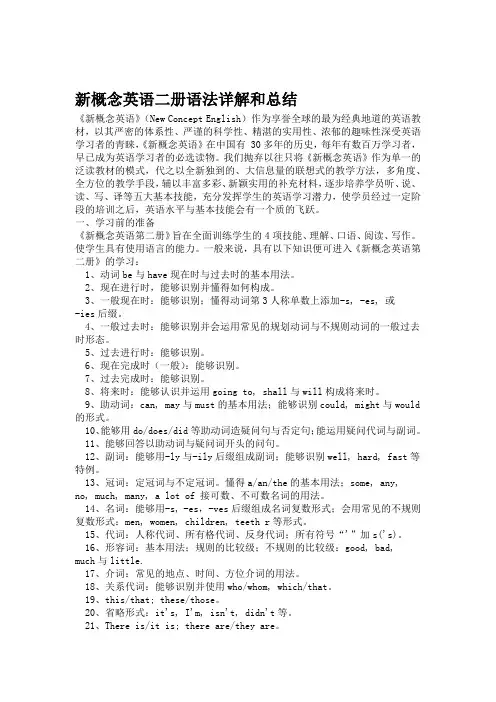
新概念英语二册语法详解和总结《新概念英语》(New Concept English)作为享誉全球的最为经典地道的英语教材,以其严密的体系性、严谨的科学性、精湛的实用性、浓郁的趣味性深受英语学习者的青睐,《新概念英语》在中国有 30多年的历史,每年有数百万学习者,早已成为英语学习者的必选读物。
我们抛弃以往只将《新概念英语》作为单一的泛读教材的模式,代之以全新独到的、大信息量的联想式的教学方法,多角度、全方位的教学手段,辅以丰富多彩、新颖实用的补充材料,逐步培养学员听、说、读、写、译等五大基本技能,充分发挥学生的英语学习潜力,使学员经过一定阶段的培训之后,英语水平与基本技能会有一个质的飞跃。
一、学习前的准备《新概念英语第二册》旨在全面训练学生的4项技能、理解、口语、阅读、写作。
使学生具有使用语言的能力。
一般来说,具有以下知识便可进入《新概念英语第二册》的学习:1、动词be与have现在时与过去时的基本用法。
2、现在进行时,能够识别并懂得如何构成。
3、一般现在时:能够识别;懂得动词第3人称单数上添加-s, -es, 或-ies后缀。
4、一般过去时:能够识别并会运用常见的规划动词与不规则动词的一般过去时形态。
5、过去进行时:能够识别。
6、现在完成时(一般):能够识别。
7、过去完成时:能够识别。
8、将来时:能够认识并运用going to, shall与will构成将来时。
9、助动词:can, may与must的基本用法;能够识别could, might与would 的形式。
10、能够用do/does/did等助动词造疑问句与否定句;能运用疑问代词与副词。
11、能够回答以助动词与疑问词开头的问句。
12、副词:能够用-ly与-ily后缀组成副词;能够识别well, hard, fast等特例。
13、冠词:定冠词与不定冠词。
懂得a/an/the的基本用法;some, any, no, much, many, a lot of 接可数、不可数名词的用法。
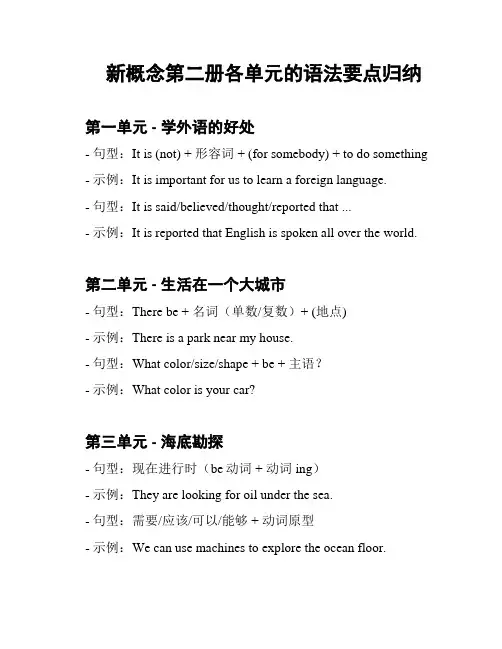
新概念第二册各单元的语法要点归纳第一单元 - 学外语的好处- 句型:It is (not) + 形容词 + (for somebody) + to do something - 示例:It is important for us to learn a foreign language.- 句型:It is said/believed/thought/reported that ...- 示例:It is reported that English is spoken all over the world.第二单元 - 生活在一个大城市- 句型:There be + 名词(单数/复数)+ (地点)- 示例:There is a park near my house.- 句型:What color/size/shape + be + 主语?- 示例:What color is your car?第三单元 - 海底勘探- 句型:现在进行时(be动词 + 动词ing)- 示例:They are looking for oil under the sea.- 句型:需要/应该/可以/能够 + 动词原型- 示例:We can use machines to explore the ocean floor.第四单元 - 名人的生活- 句型:情态动词 + 动词原型- 示例:She can sing very well.- 句型:主语 + be + 形容词 + to do something- 示例:Be patient to wait for your turn.第五单元 - 健康与健身- 句型:情态动词 + 动词原型- 示例:You should exercise regularly.- 句型:主语 + need(s) + to do something- 示例:We need to eat a balanced diet.第六单元 - 书信写作- 句型:谓语动词 + 宾语 + 动词-ing- 示例:I enjoy reading books.- 句型:It is + adj. + of + somebody + to do something - 示例:It is kind of you to help me.第七单元 - 未来生活- 句型:将来时态(will/shall + 动词原型)- 示例:We will have robots to do household chores.- 句型:It is + adj. + that + 从句- 示例:It is certain that technology will change our lives.第八单元 - 代购- 句型:情态动词 + be + adj. + to do something- 示例:I must be careful not to buy counterfeit products. - 句型:主语 + be + 形容词 + of + 宾语- 示例:The article is full of useful information.第九单元 - 旅游- 句型:现在完成时态(have/has + 过去分词)- 示例:I have visited many cities in Europe.- 句型:It is + adj./adv. + that + 从句- 示例:It is true that travel broadens the mind.。
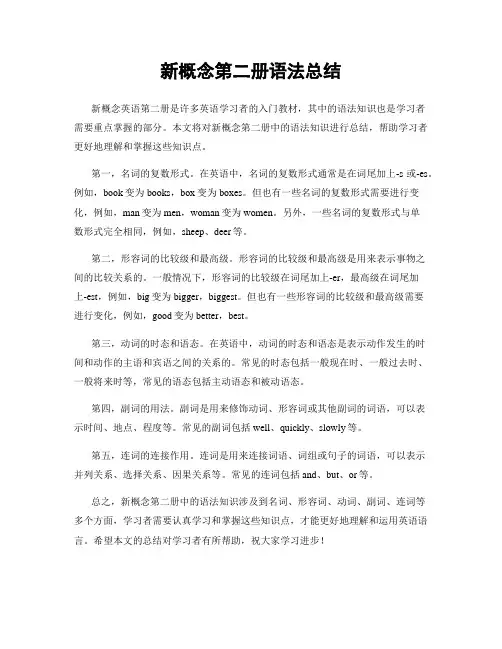
新概念第二册语法总结新概念英语第二册是许多英语学习者的入门教材,其中的语法知识也是学习者需要重点掌握的部分。
本文将对新概念第二册中的语法知识进行总结,帮助学习者更好地理解和掌握这些知识点。
第一,名词的复数形式。
在英语中,名词的复数形式通常是在词尾加上-s或-es。
例如,book变为books,box变为boxes。
但也有一些名词的复数形式需要进行变化,例如,man变为men,woman变为women。
另外,一些名词的复数形式与单数形式完全相同,例如,sheep、deer等。
第二,形容词的比较级和最高级。
形容词的比较级和最高级是用来表示事物之间的比较关系的。
一般情况下,形容词的比较级在词尾加上-er,最高级在词尾加上-est,例如,big变为bigger,biggest。
但也有一些形容词的比较级和最高级需要进行变化,例如,good变为better,best。
第三,动词的时态和语态。
在英语中,动词的时态和语态是表示动作发生的时间和动作的主语和宾语之间的关系的。
常见的时态包括一般现在时、一般过去时、一般将来时等,常见的语态包括主动语态和被动语态。
第四,副词的用法。
副词是用来修饰动词、形容词或其他副词的词语,可以表示时间、地点、程度等。
常见的副词包括well、quickly、slowly等。
第五,连词的连接作用。
连词是用来连接词语、词组或句子的词语,可以表示并列关系、选择关系、因果关系等。
常见的连词包括and、but、or等。
总之,新概念第二册中的语法知识涉及到名词、形容词、动词、副词、连词等多个方面,学习者需要认真学习和掌握这些知识点,才能更好地理解和运用英语语言。
希望本文的总结对学习者有所帮助,祝大家学习进步!。
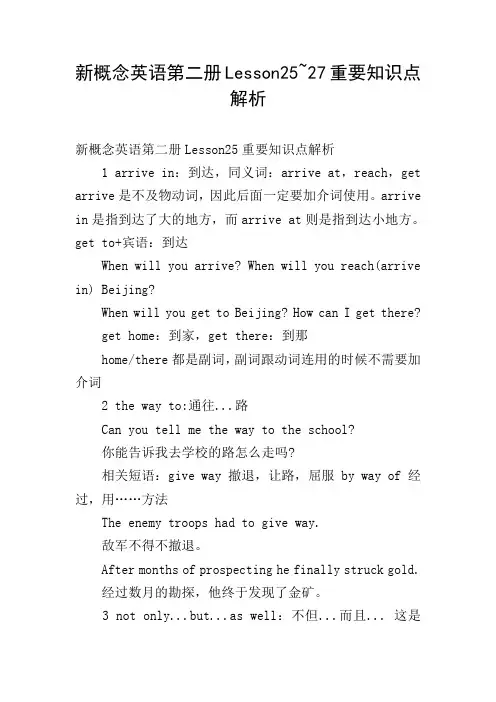
新概念英语第二册Lesson25~27重要知识点解析新概念英语第二册Lesson25重要知识点解析1 arrive in:到达,同义词:arrive at,reach,get arrive是不及物动词,因此后面一定要加介词使用。
arrive in是指到达了大的地方,而arrive at则是指到达小地方。
get to+宾语:到达When will you arrive? When will you reach(arrive in) Beijing?When will you get to Beijing? How can I get there?get home:到家,get there:到那home/there都是副词,副词跟动词连用的时候不需要加介词2 the way to:通往...路Can you tell me the way to the school?你能告诉我去学校的路怎么走吗?相关短语:give way 撤退,让路,屈服 by way of 经过,用……方法The enemy troops had to give way.敌军不得不撤退。
After months of prospecting he finally struck gold.经过数月的勘探,他终于发现了金矿。
3 not only...but...as well:不但...而且... 这是一个并列连词,表示什么东西并列连接什么I can speak Chinese. I can speak English.组合到一句话即为:I can speak not only Chinese but English as well.类似的句子如:I not only sing but dance as well.一般来说,not only 喜欢放在动词的前面。
遇到实义动词和非实义动词的时候则习惯放在二者之间。
I can speak not only Chinese but English as well.4 neither...nor... 即不...也不...neither单独使用时词性很灵活,可以做代词,表示两者都不;做形容词表示两者都不的;做副词表示也不;做连词时表示既不,也不的意思。
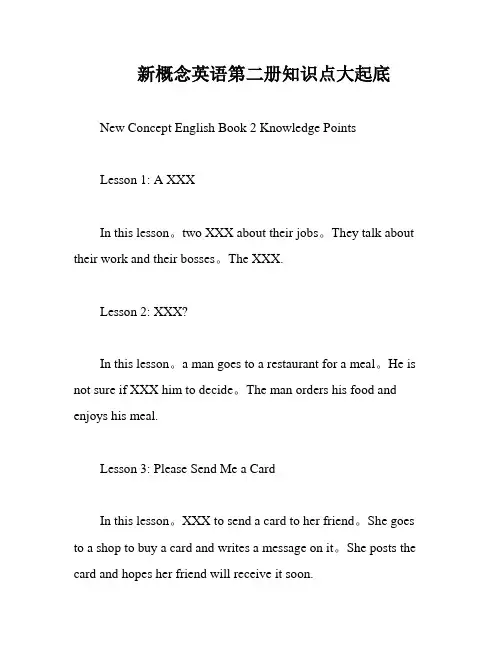
新概念英语第二册知识点大起底New Concept English Book 2 Knowledge PointsLesson 1: A XXXIn this lesson。
two XXX about their jobs。
They talk about their work and their bosses。
The XXX.Lesson 2: XXX?In this lesson。
a man goes to a restaurant for a meal。
He is not sure if XXX him to decide。
The man orders his food and enjoys his meal.Lesson 3: Please Send Me a CardIn this lesson。
XXX to send a card to her friend。
She goes to a shop to buy a card and writes a message on it。
She posts the card and hopes her friend will receive it soon.Lesson 4: An Exciting TripIn this lesson。
a man goes on a trip to XXX his friends about his trip when he returns home.Lesson 5: No Wrong NumbersIn this lesson。
a woman is trying to make a telephone call。
She dials the wrong number several times and XXX。
XXX friend.Lesson 6: Percy ButtonsIn this lesson。
a man called Percy Buttons is looking for a job。
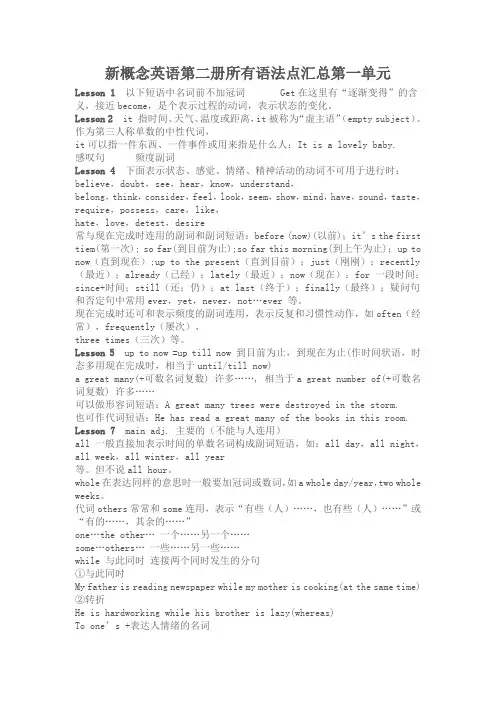
新概念英语第二册所有语法点汇总第一单元Lesson 1 以下短语中名词前不加冠词Get在这里有“逐渐变得”的含义,接近become,是个表示过程的动词,表示状态的变化。
Lesson 2 it 指时间、天气、温度或距离,it被称为“虚主语”(empty subject)。
作为第三人称单数的中性代词,it可以指一件东西、一件事件或用来指是什么人:It is a lovely baby.感叹句频度副词Lesson 4 下面表示状态、感觉、情绪、精神活动的动词不可用于进行时:believe,doubt,see,hear,know,understand,belong,think,consider,feel,look,seem,show,mind,have,sound,taste,require,possess,care,like,hate,love,detest,desire常与现在完成时连用的副词和副词短语:before (now)(以前);it’s the first tiem(第一次); so far(到目前为止);so far this morning(到上午为止);up to now(直到现在);up to the present(直到目前);just(刚刚);recently (最近);already(已经);lately(最近);now(现在);for 一段时间;since+时间;still(还;仍);at last(终于);finally(最终);疑问句和否定句中常用ever,yet,never,not…ever 等。
现在完成时还可和表示频度的副词连用,表示反复和习惯性动作,如often(经常),frequently(屡次),three times(三次)等。
Lesson 5 up to now =up till now 到目前为止,到现在为止(作时间状语,时态多用现在完成时,相当于until/till now)a great many(+可数名词复数) 许多……, 相当于a great number of(+可数名词复数) 许多……可以做形容词短语:A great many trees were destroyed in the storm.也可作代词短语:He has read a great many of the books in this room. Lesson 7 main adj. 主要的(不能与人连用)all 一般直接加表示时间的单数名词构成副词短语,如:all day,all night,all week,all winter,all year等。
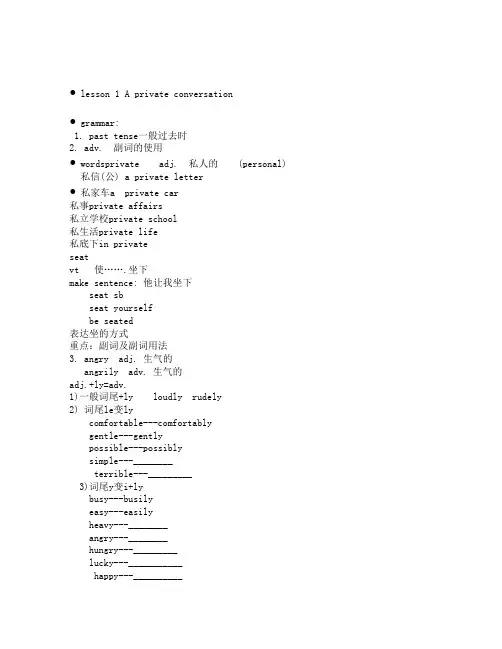
•lesson 1 A private conversation •grammar:1. past tense一般过去时2. adv. 副词的使用•wordsprivate adj. 私人的 (personal) 私信(公) a private letter•私家车a private car私事private affairs私立学校private school私生活private life私底下in privateseatvt 使…….坐下make sentence: 他让我坐下seat sbseat yourselfbe seated表达坐的方式重点:副词及副词用法3. angry adj. 生气的angrily adv. 生气的adj.+ly=adv.1)一般词尾+ly loudly rudely2) 词尾le变lycomfortable---comfortablygentle---gentlypossible---possiblysimple---________terrible---_________3)词尾y变i+lybusy---busilyeasy---easilyheavy---________angry---________hungry---_________lucky---___________happy---__________•他开心地去瑞安了。
•He went to Rui’an happily.•make sentence•angrily/rudely/hungrily/luckly/busily/stupidly/sadly Attention n. 注意稍加注意 ___________________________多加注意 ___________________________更多注意___________________________不注意___________________________You must pay attention _____ that girl.Attention passengers, the plane is leaving.汉译:______________________bear (bore, born)练习1. I left.I could not put up_____ him2.I can't ________忍受 you. You are so rude. Business n. 事, 生意business man :生意人do business: 做生意on business 出差It's none of your business. 不关你的事。
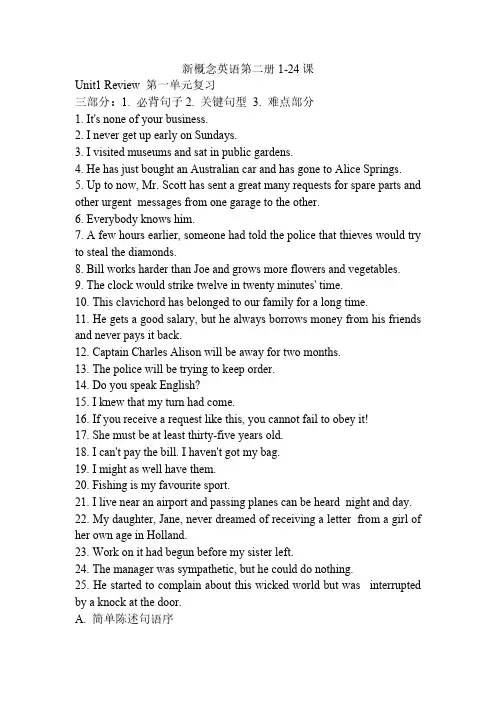
新概念英语第二册1-24课Unit1 Review 第一单元复习三部分:1. 必背句子2. 关键句型 3. 难点部分1. It's none of your business.2. I never get up early on Sundays.3. I visited museums and sat in public gardens.4. He has just bought an Australian car and has gone to Alice Springs.5. Up to now, Mr. Scott has sent a great many requests for spare parts and other urgent messages from one garage to the other.6. Everybody knows him.7. A few hours earlier, someone had told the police that thieves would try to steal the diamonds.8. Bill works harder than Joe and grows more flowers and vegetables.9. The clock would strike twelve in twenty minutes' time.10. This clavichord has belonged to our family for a long time.11. He gets a good salary, but he always borrows money from his friends and never pays it back.12. Captain Charles Alison will be away for two months.13. The police will be trying to keep order.14. Do you speak English?15. I knew that my turn had come.16. If you receive a request like this, you cannot fail to obey it!17. She must be at least thirty-five years old.18. I can't pay the bill. I haven't got my bag.19. I might as well have them.20. Fishing is my favourite sport.21. I live near an airport and passing planes can be heard night and day.22. My daughter, Jane, never dreamed of receiving a letter from a girl of her own age in Holland.23. Work on it had begun before my sister left.24. The manager was sympathetic, but he could do nothing.25. He started to complain about this wicked world but was interrupted by a knock at the door.A. 简单陈述句语序a. 1. I enjoyed the film yesterday.2. My mother went to market.3. (This morning) the children asked questions continuously in class4. (on Sundays) we stay at home (on Sundays).5. (This morning) I borrowed a book from the library (this morning).b. 1. She rarely answers my letters.2. The shops always close on Saturday afternoons.3. We never work after six o'clock.4. We sometimes spend our holidays abroad.5. Do you ever buy CDs?B. 动词a. Now and Alwaysb. What happened?c. What has happened?d. What happened? What has happened?1. What __ you __ (buy) yesterday? [did, buy]2. Up till now, he ___ never __ (lend) me anything. [has, lent]3. __ you __ ( burn) those old papers yet? [Have, burnt]4. He __ (fight) in Flanders in the First World War. [fought]5. We __ just __ (win) the match. [have, won]e. What was happening? What happened?1. As my father __ (leave) the house, the postman __ (arrive).[was leaving / left, arrived]2. Tom __ (work) in the garden while I __ (sit) in the sun.[was working / worked, was sitting / sat]3. As I __ (walk) down the street, I __ (meet) Charlie.[was walking / walked, met]4. While he __ (read) the letter, he __ (hear) a knock at thedoor. [was reading, heard]C. must, have to, can and maymust:必须have to:不得不(客观要求)表达请求或询问时,can / may二者可以互换D. a, the and someE. the best and the worst1. It is the most unusual film I've ever seen.2. Mr. Jones is a better teacher than Mr. Brown.3. This book is more interesting than that one.4. She is the laziest pupil in the class.a. 单音节词,一般直接在词尾加-er,-est.特殊情况:以-e结尾:直接加r / st以-y结尾:变y为i再加er / est以一个元音+ 辅音结尾:双写末尾辅音,再加er / estbigger, strongest, taller, larger, shiest …b. 双音节词,除以-y结尾的双音节形容词,先变y为i再加er和est 外,其他绝大多数双音节词是分别在此前加more和mostc. 多音节词都是分别在前面加more和mostmore interesting, the most successfuld. 不规则词good / well, bad / ill, little, many / much, far, oldF. in, on, atG. 动介搭配1. by the way:顺便问一下on the way:在… 的路上2. borrow from:从… 借来lend sth. to sb.:把… 借给3. ask questions:问问题ask for help:求助4. grow:成长(动作,过程)grow up:成熟,长大5. beside:在… 旁边besides:除此之外6. it's - it is ; it hasits 所有格代词,它的7. yet通常用在疑问句或否定句中,表示“某事预期发生,却还未发生”Is dinner ready yet? I'm starving.still 表示"因某事持续的时间比预期的要久而惊讶的"Is it still raining?8. on one's desk:在某人桌上in one's office:在某人办公室9. it is 指代;形式主语;天气(adj. / v.)there be:有;there be sb. doing sth. ; 天气(n.)10. stay at home:待在家in my house:在我房子里词汇重点讲解一:近义词/ 用法seat n.座位seat / sitvt. 及物动词坐下seat + oneselfseatedThey seated themselves on the grass.他们在草地上坐下Be seated, please.请各位落座吧I found the girl seated in the chair, crying loudly. 我发现小姑娘坐在椅子上大声哭泣sit vi.sit down:坐下stand up:站起来loudly loud / aloud / loudlyloudadj. 声音响亮的His voice is loud.他的声音响亮adv.Can you speak louder, please? (副词比较级)您能再大声一点么aloudadv. 大声地(can be heard 重点在于出声)[formal]正式场合使用He read一般过去时the letter aloud to us. 大声读信She cried aloud in protest. 大声抗议loudly adv. 副词意思和loud作副词时一样,但是搭配位置不同①loud 只能放在动词后面speak / talk / laugh loud②loudly 可以放在动词前后speak / talk / laugh loudlyThe audience laughed loudly at the joke.台上有人讲笑话,下面的人大声笑The cock loudly crows outside my window.公鸡在我窗户外面大声啼鸣。
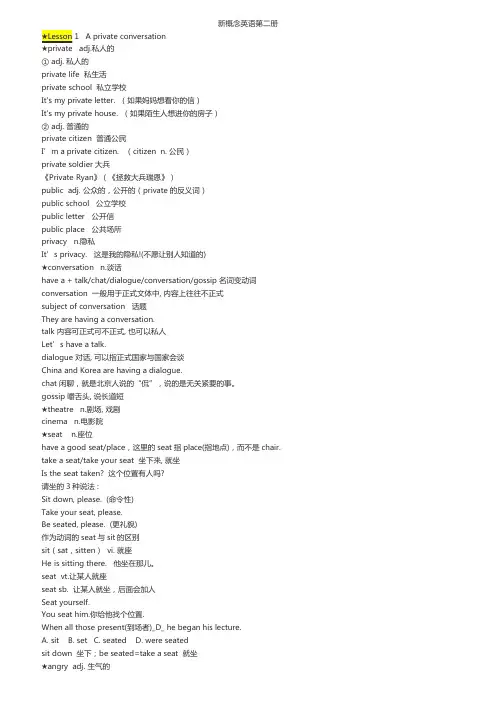
新概念英语第二册私人的① adj. 私人的private life 私生活private school 私立学校It's my private letter. (如果妈妈想看你的信)It's my private house. (如果陌生人想进你的房子)② adj. 普通的private citizen 普通公民I’m a private citizen. (citizen n. 公民)private soldier 大兵《Private Ryan》(《拯救大兵瑞恩》)public adj. 公众的,公开的(private的反义词)public school 公立学校public letter 公开信public place 公共场所privacy n.隐私It’s privacy. 这是我的隐私!(不愿让别人知道的)★conversation n.谈话have a + talk/chat/dialogue/conversation/gossip 名词变动词conversation 一般用于正式文体中, 内容上往往不正式subject of conversation 话题They are having a conversation.talk 内容可正式可不正式, 也可以私人Let’s have a talk.dialogue 对话, 可以指正式国家与国家会谈China and Korea are having a dialogue.chat 闲聊,就是北京人说的“侃”,说的是无关紧要的事。
gossip 嚼舌头, 说长道短★theatre n.剧场, 戏剧cinema n.电影院★seat n.座位have a good seat/place,这里的seat指place(指地点),而不是chair. take a seat/take your seat 坐下来, 就坐Is the seat taken? 这个位置有人吗?请坐的3种说法 :Sit down, please. (命令性)Take your seat, please.Be seated, please. (更礼貌)作为动词的seat与sit的区别sit(sat,sitten) vi. 就座He is sitting there. 他坐在那儿。
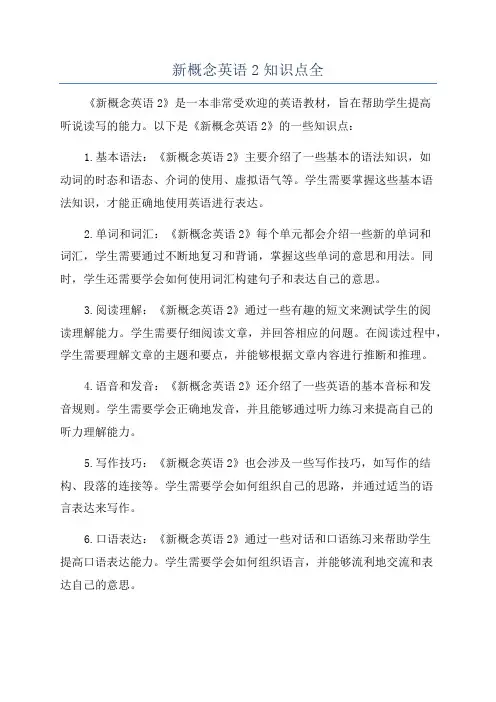
新概念英语2知识点全《新概念英语2》是一本非常受欢迎的英语教材,旨在帮助学生提高听说读写的能力。
以下是《新概念英语2》的一些知识点:1.基本语法:《新概念英语2》主要介绍了一些基本的语法知识,如动词的时态和语态、介词的使用、虚拟语气等。
学生需要掌握这些基本语法知识,才能正确地使用英语进行表达。
2.单词和词汇:《新概念英语2》每个单元都会介绍一些新的单词和词汇,学生需要通过不断地复习和背诵,掌握这些单词的意思和用法。
同时,学生还需要学会如何使用词汇构建句子和表达自己的意思。
3.阅读理解:《新概念英语2》通过一些有趣的短文来测试学生的阅读理解能力。
学生需要仔细阅读文章,并回答相应的问题。
在阅读过程中,学生需要理解文章的主题和要点,并能够根据文章内容进行推断和推理。
4.语音和发音:《新概念英语2》还介绍了一些英语的基本音标和发音规则。
学生需要学会正确地发音,并且能够通过听力练习来提高自己的听力理解能力。
5.写作技巧:《新概念英语2》也会涉及一些写作技巧,如写作的结构、段落的连接等。
学生需要学会如何组织自己的思路,并通过适当的语言表达来写作。
6.口语表达:《新概念英语2》通过一些对话和口语练习来帮助学生提高口语表达能力。
学生需要学会如何组织语言,并能够流利地交流和表达自己的意思。
7.文化背景:《新概念英语2》还会介绍一些英语国家的文化背景和习俗。
通过了解不同的文化背景,学生可以更好地理解和运用所学的英语知识。
以上是《新概念英语2》的一些主要知识点,通过学习这些知识点,学生可以提高听说读写的各项能力。
但是,单纯地掌握这些知识点还不够,学生需要通过不断地练习和实践,才能真正地运用这些知识点来进行有效的英语交流。
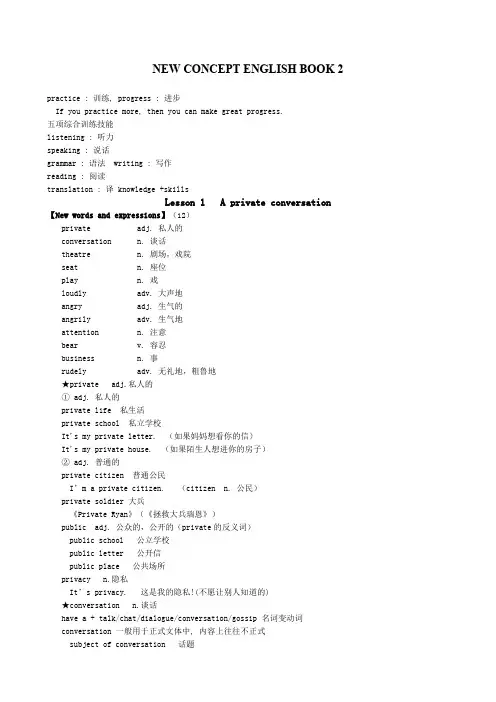
NEW CONCEPT ENGLISH BOOK 2practice : 训练, progress : 进步If you practice more, then you can make great progress.五项综合训练技能listening : 听力speaking : 说话grammar : 语法 writing : 写作reading : 阅读translation : 译 knowledge +skillsLesson 1 A private conversation 【New words and expressions】(12)private adj. 私人的conversation n. 谈话theatre n. 剧场,戏院seat n. 座位play n. 戏loudly adv. 大声地angry adj. 生气的angrily adv. 生气地attention n. 注意bear v. 容忍business n. 事rudely adv. 无礼地,粗鲁地★private adj.私人的① adj. 私人的private life 私生活private school 私立学校It's my private letter. (如果妈妈想看你的信)It's my private house. (如果陌生人想进你的房子)② adj. 普通的private citizen 普通公民I’m a private citizen. (citizen n. 公民)private soldier 大兵《Private Ryan》(《拯救大兵瑞恩》)public adj. 公众的,公开的(private的反义词)public school 公立学校public letter 公开信public place 公共场所privacy n.隐私It’s privacy. 这是我的隐私!(不愿让别人知道的)★conversation n.谈话have a + talk/chat/dialogue/conversation/gossip 名词变动词conversation 一般用于正式文体中, 内容上往往不正式subject of conversation 话题They are having a conversation.talk 内容可正式可不正式, 也可以私人Let’s have a talk.dialogue 对话, 可以指正式国家与国家会谈China and Korea are having a dialogue.chat 闲聊,就是北京人说的“侃”,说的是无关紧要的事。
新概念英语第 二 册知识点梳理 课文 词汇短语 句型语法 第一单元 Lesson 1 A private conversation Private, conversation, seat, play, loudly, angry, angrily, attention, bear, rudely 简单陈述句及其语序 Lesson 2 Breakfast or lunch? until, outside, ring, repeat now, often and always,表示现在和经 常发生的动作,如:I’m coming to see you. / I never get up early on Sundays. / I sometimes stay in bed until lunchtime. Lesson 3 Please send me a card Send, spoil, friendly, lend, decision, whole, single 一般过去时(参考第一册第 67-78 课) Lesson 4 An exciting trip exciting, receive, different, centre, abroad 现在完成时(参考第一册第 83-90 课) Lesson 5 No wrong numbers message, cover, distance, request, service 一般过去时与现在完成时的区别 Lesson 6 Percy Buttons beggar, food, pocket, call a, the 和 some 的用法 Lesson 7 Too late detective, airport, expect, valuable, steal, main, guard, precious 过去进行时,表示过去某个时刻正在 发生的动作或状态,如:When I was watering the garden, it began to rain. Lesson 8 The best and the worst competition, neat, path, wooden, pool 比较级和最高级(参考第一册第 107-112 课) Lesson 9 A cold welcome welcome, crowd, gather, hand, shout, refuse, laugh 表示时间的短语,如:at 9 o’clock, at night, in ten minutes, in 1939, in summer, in August, in January, in the afternoon, on Tuesday, on April 27 th , from 9 till 5, during the night, until 10 o’clock Lesson 10 Not for jazz musical, instrument, recently, damage, key, string, shock, allow, touch (一般过去时中的)被动语态(参考 第一册第 141-144 课) Lesson 11 One good tur deserves another turn, deserve, lawyer, bank, salary, immediately 复习第 2-10 课的关键句型 Lesson 12 Goodbye and good luck Luck, captain, sail, harbour, proud, important 一般将来时(参考第一册第 91-96 课) Lesson 13 The Greenwood Boys group, pop singer, club, performance, occasion 将来进行时,表示将来某个时刻正在 发生的动作或状态,如:I shall be writing letters all day tomorrow. / She will be getting ready for the party tomorrow. / He’ll be arriving in a minute. Lesson 14 Do you speak English? amusing, experience, wave, lift, reply, language, journey 过去完成时(参考第一册第 119-120 课) Lesson 15 Good news secretary, nervous, afford, weak, interrupt (主句动作发生在过去的)间接引语 (参考第一册第 99-102 课和第 133-136 课) Lesson 16 A polite request park, traffic, ticket, note, area, sign, reminder, fail, obey if 引导的条件句(参考第一册第 137-138 课) Lesson 17 Always young appear, stage, bright, stocking, sock must的用法(参考第一册第61-66课): 与 have to 和 have got to 的区别 Lesson 18 He often does this! pub, landlord, bill have 的用法(参考第一册第 81-82 课) Lesson 19 Sold out hurry, ticket office, pity, exclaim, return, sadly can 和 may 的用法(参考第一册第 127-132 课) Lesson 20 One man in a boat catch, fisherman, boot, waste, realize 动名词的用法(作主语和宾语),如: Reading in bed is something I always enjoy. / She’s afraid of staying in that house alone. / After looking at his watch, he hurried to the station. Lesson 21 Mad or not? mad, reason, sum, determined (与助动词或情态动词连用的)被动 语态的用法(参考第 10 课) Lesson 22 A glass envelope dream, age, channel, throw 后面可跟 of, from, in, on 的动词 Lesson 23 A new house complete, modern, strange, district 复习第 12-21 课的关键句型 Lesson 24 It could be worse manager, upset, sympathetic, complain, wicked, contain, honesty 复习第 2-23 课的难点 第二单元 Lesson 25 Do the English speak English? railway, porter, several, foreigner, wonder 并列句中的语序 Lesson 26 he best art critics art, critic, paint, pretend, pattern, curtain, material appreciate, notice, whether, hang, critically, upside down 经常发生的事情的表达,如:Do you always get up so late? / The sun rises in the east and sets in the west. / I hear that you like classical music. Lesson 27 A wet night tent, field, smell, wonderful, creep, sleeping bag, comfortable, soundly, leap, heavily, stream, form, wind, right 一般过去时(参考第 3 课) Lesson 28 No parking rare, ancient, myth, trouble, effect 现在完成时(参考第 4 课) Lesson 29 Taxi! taxi, land, plough, lonely, roof, 一般过去时与过去完成时(参考第 5 block, flat, desert 课) Lesson 30 Football or polo? polo, cut, row, kick, towards, nearly, sight a, the, some 和 any 的用法(参考第 6